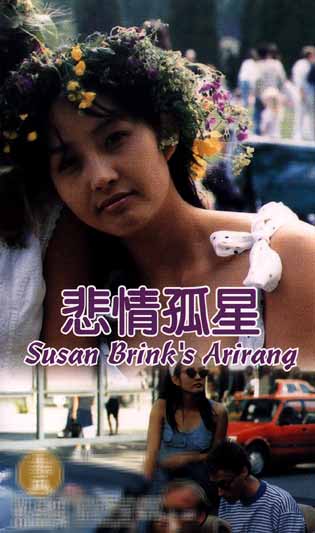" I would myself have preferred to stay in Korea instead of being adopted and doomed to a lifelong status as an outsider, becoming a lifelong object of racism and discrimination..." - Susanne Brink
On March 6th 2009 Susanne Brink was buried in her Swedish hometown Norrköping, after she died on January 23th 2009 at the age of 45 after a fight with cancer. Susanne Brink, a Swedish Korean adoptee, brought the issue of international adoption to attention in South-Korea in 1991 after a film on her life's story was released.
 The film Susanne Brink's Arirang shocked South-Korea. It showed the story of a child sent abroad to face a childhood of abuse, discrimination and racism. With it's release the issue of international adoption from Korea gained attention for the first time in the country where international adoption itself was born.
The film Susanne Brink's Arirang shocked South-Korea. It showed the story of a child sent abroad to face a childhood of abuse, discrimination and racism. With it's release the issue of international adoption from Korea gained attention for the first time in the country where international adoption itself was born.Adoption from South-Korea started after the Korean War, when the Holt family went to Korea in 1955 and adopted eight war orphans. Since then estimates of Korean children that have been sent abroad range from 150,000, babies according to the Korean Ministry of Health and Welfare, and over 200,000 by other sources. Still Korea sends around 2,000 babies abroad yearly for adoption, despite being one of the top economies in the world and one of the most developed countries. A 1988 estimate shows the hard currency adoption brings to Korea: 15 to 20 million dollars a child...
Susanne Brink dedicated a lot of time to shedding light on the serious problems that international adoption entails, and on almost all accounts I agree with her... There is no need to send children abroad from a developed country such as South-Korea. The countries possesses all the resources to take care of it's own.
But the sad truth is that South-Korea, while considered a developed nation, is in many ways still struggling with obsolete traditions - and wrong traditions. Single mothers are still facing stigmatization, family planning and safer sex education are lacking extremely, centuries of Confucanism are still taking it's toll.
And international adoption cannot escape it's inherent racialized issues... children of color, exotic babies, welcomed in the arms of well meaning white parents and families in the rich and developed - civilized- West... For a price that is.
t'Was early in mornings past
I looked to the sky, to the east
Heared a soft drop of rain,
maybe it lost its way trying to find
its cloud again
I heared a soft drop of rain, falling
maybe you heared it as well
- He-Jin Kim
Seoul, March 7th 2009
Dedicated to all those who try to make sense of "home"


5 comments:
'어머니'를 검색 중에 수전에 대해 읽었습니다. 기억의 조각이라도 가져갔으면 하고 글을 남깁니다. Peace~
Hoejin, I'm sorry my Korean isn't that good. Though thank you for your response, Susanne will be missed... she deserved a life in peace in happiness more than any other
I'a sorry my English is poor.
Hejin, I'm very impressed with your post of 'Susanne Brink'.
And I read some of your posts and Sussane's articles.
I miss Susanne.
May God bless you!
Thank you, Hejin.
Here, Changwon
I didn't know that Susanne had passed. I first watched the movie in 1991 and it's been seared in my mind ever since. Although it doesn't bear resemblence to how children are treated by their adoptive families, it was definitely an eye-opener. From the scene where Susanne asks her birth mother if it's her birthday because she had prepared a big meal and realising that she's going to be sent away, and that gut-wrenching scene at the airport, right to the end, where she's reunited with her family in Korea, it had me crying buckets of tears. I remember calling my mother and telling her about the movie. I wish I could get it on DVD or video. Can't seem to find it anywhere...
Do you know what happened to Susannes daughter?
Post a Comment